Overview
This article delineates five best practices for effective healthcare app development services, underscoring the critical importance of:
- Defining app objectives
- Conducting comprehensive market research
- Selecting the appropriate development partner
- Integrating essential features while ensuring regulatory compliance
- Planning for post-launch support
Each of these practices is bolstered by various examples and case studies, demonstrating how tailored strategies and ongoing improvements can significantly enhance user engagement and fulfill the specific needs of patients within the healthcare sector.
Introduction
The rapid evolution of healthcare technology necessitates that developers not only keep pace but excel in creating applications that genuinely address user needs. By implementing best practices in healthcare app development, stakeholders can ensure their solutions are effective, compliant, and user-friendly. Yet, with an ever-growing market and the complexities of regulatory frameworks, how can developers navigate these challenges to create impactful healthcare applications? This article explores five essential practices that guide developers in crafting successful healthcare apps, resonating with their target audience and distinguishing themselves in a competitive landscape.
Define Your Healthcare App's Objectives and Target Audience
To effectively define your application's objectives, begin by pinpointing the specific problems your app is designed to address. Engage with stakeholders, including healthcare professionals and prospective clients, to gather valuable insights into their needs for healthcare app development services. Develop personas that accurately represent your target audience, considering critical factors such as demographics, health conditions, and technology proficiency. This approach will enable you to customize the app's attributes and capabilities to meet expectations and enhance user engagement.
For instance, if your app targets elderly patients managing chronic conditions, prioritize features that simplify medication tracking and appointment scheduling. A report highlights that healthcare app development services have significantly improved access to care for patients in remote or underserved regions, underscoring the importance of addressing specific needs. By aligning your app's objectives with the requirements of your target audience, you can ensure a more relevant and impactful solution.
As Konstantin Kalinin, Head of Content, asserts, "Begin with an interactive prototype and ensure you allocate sufficient time evaluating it with actual participants from your target audience." This methodology is reinforced by case studies, such as those focused on Chronic Disease Management Apps, which demonstrate the effectiveness of tailoring app features to meet specific user needs. Moreover, adherence to regulations like HIPAA is crucial in healthcare app development services, ensuring your solution complies with necessary legal standards.
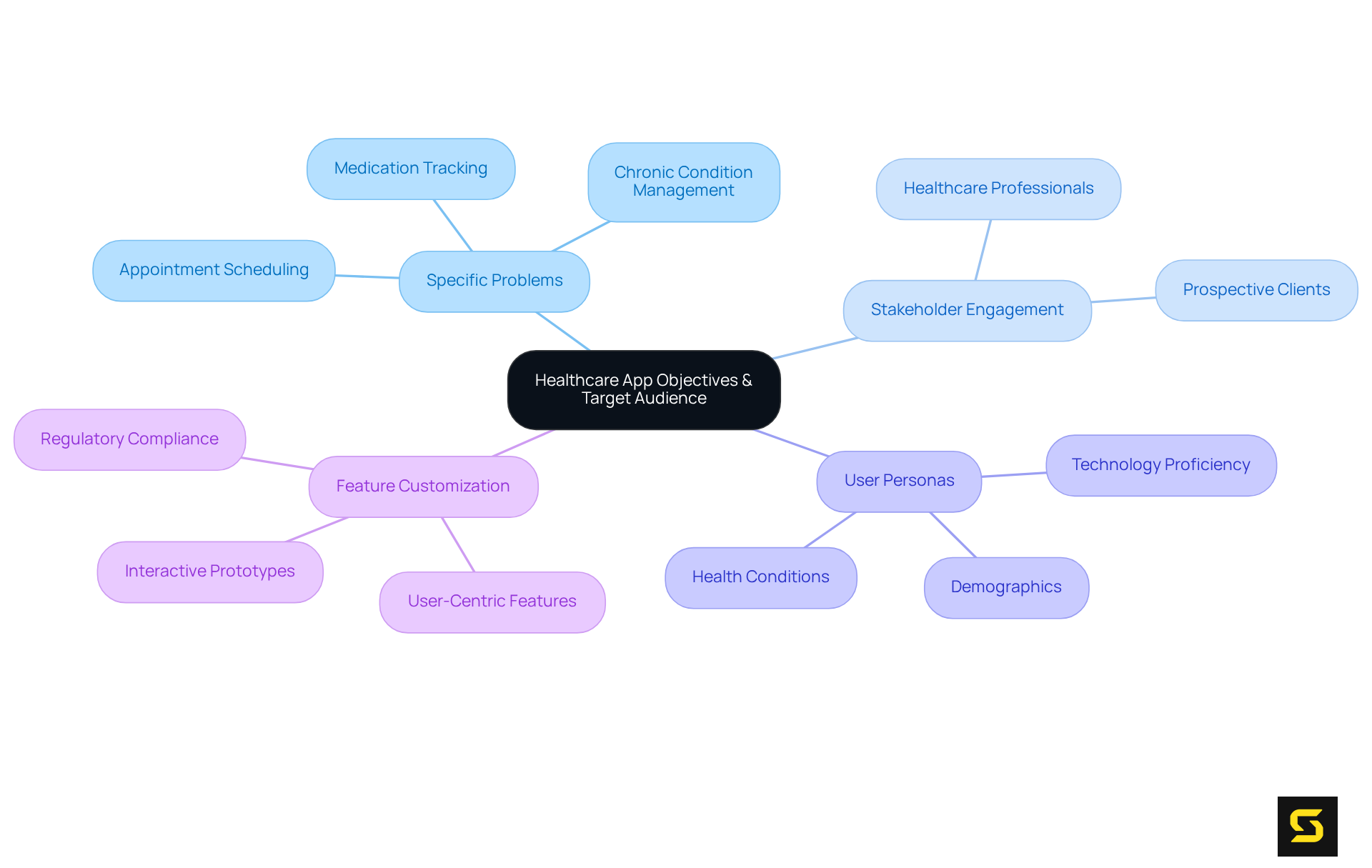
Conduct Comprehensive Market Research and Competitive Analysis
Begin your market research by scrutinizing current medical applications that serve similar purposes. Identify their strengths, weaknesses, and user feedback to discern what functions effectively and what falls short. Employ tools such as SWOT analysis to assess competitors and uncover opportunities for differentiation.
Moreover, collect data on industry trends, particularly the surging demand for telehealth services, which has proven especially effective in areas like behavioral health and oncology, as highlighted by Colin Hung. The North American healthcare mobile applications market is anticipated to approach nearly USD 350 billion by 2027, highlighting the critical need for healthcare app development services and comprehensive market research. Additionally, with health system ransomware attacks projected to nearly double in 2024, your healthcare app development services must prioritize security considerations in their strategy. This intelligence will inform your app's feature set and marketing approach. For example, if competitors lack user-friendly interfaces, prioritize intuitive design in your app to attract users seeking simplicity.
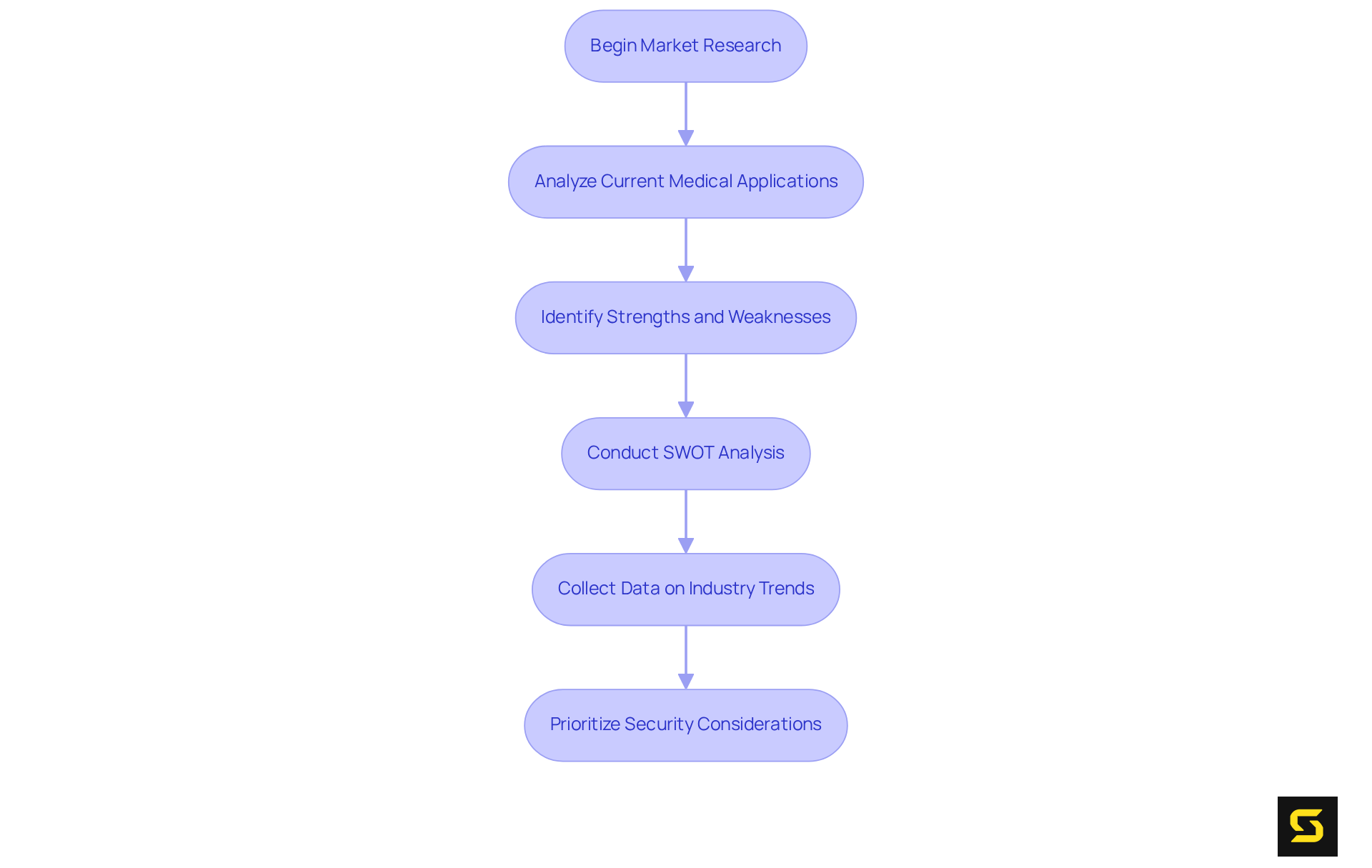
Choose the Right Healthcare App Development Partner
Choosing the right app development partner is crucial for the success of your project. Prioritize partners who provide healthcare app development services and have extensive experience in the medical field, along with a profound understanding of regulatory compliance, particularly with standards such as HIPAA and GDPR, which are essential for safeguarding sensitive patient data. Inquire about their previous healthcare app development services projects and request case studies or references to evaluate their capabilities.
Evaluate their commitment to user-centered design, which is vital for creating intuitive applications that enhance patient engagement. A proficient partner in healthcare app development services should demonstrate expertise in integrating critical features such as data security measures, including encryption and secure data storage, ensuring that sensitive patient information remains protected.
Successful projects like the MedMutual app redesign illustrate how effective collaboration and technical expertise can lead to significant improvements in customer satisfaction and operational efficiency—evidenced by a 40% decrease in assistance calls and a 95% satisfaction rate among clients. A partner with a proven track record in healthcare app development services will not only meet your specific needs but also ensure adherence to industry standards, ultimately contributing to better health outcomes for patients. Additionally, fostering effective communication and collaboration between the development team and stakeholders is vital for project success.
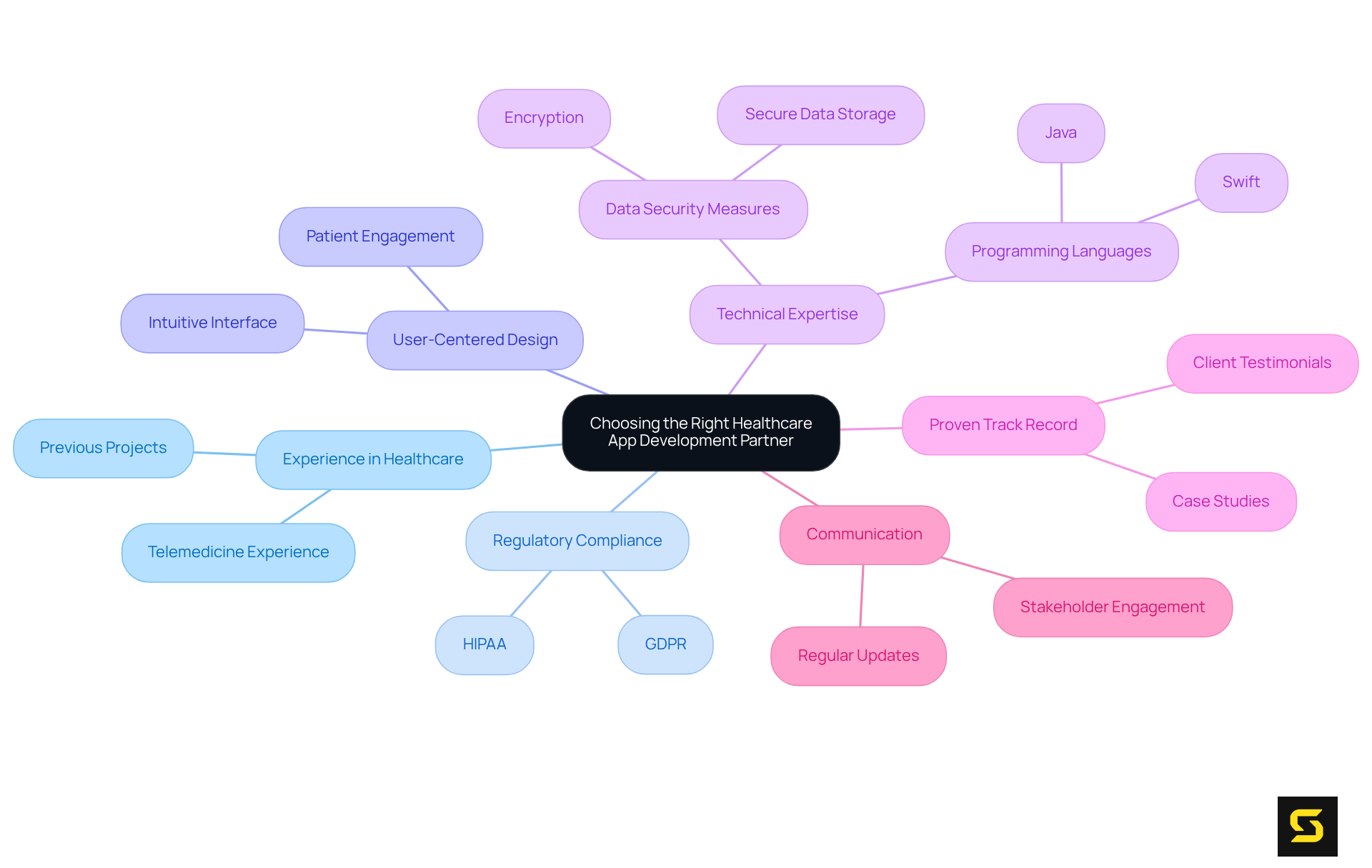
Integrate Essential Features and Ensure Compliance with Regulations
Essential components of healthcare app development services encompass:
- Secure authentication
- Data encryption
- Appointment scheduling
- Telehealth capabilities
- Medication reminders
It is imperative that your healthcare app development services comply with pertinent regulations, such as HIPAA in the U.S. and GDPR in Europe, by implementing stringent data protection measures. Regular audits and testing are crucial to identify vulnerabilities and ensure compliance with evolving regulations. For example, integrating a secure messaging feature significantly enhances patient-provider communication while adhering to privacy standards. By prioritizing both functionality and compliance in healthcare app development services, you can develop a reliable application that effectively meets the needs of individuals.
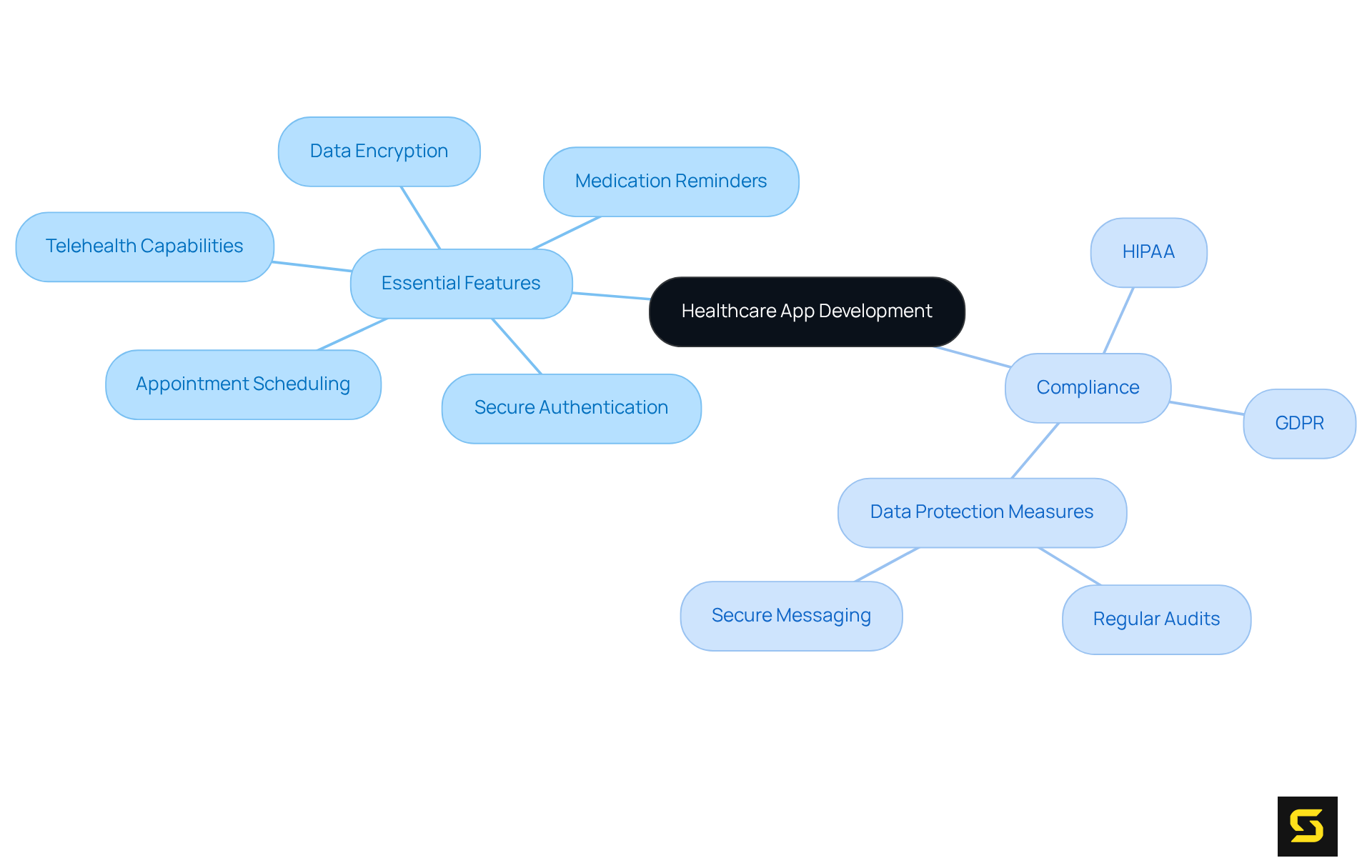
Plan for Post-Launch Support and Continuous Improvement
Following the launch of your healthcare app, it is paramount to establish a dedicated support system through healthcare app development services. This system must promptly address inquiries and technical challenges, ensuring customer satisfaction. Your team should be equipped to manage feedback effectively, utilizing analytics and performance monitoring tools, such as Firebase Performance Monitoring or New Relic. These tools will enable you to monitor app performance and identify areas that require enhancement. Collecting feedback from users through surveys or in-app prompts is essential for understanding their needs and preferences.
Develop a structured plan for regular updates that not only incorporates feedback but also adapts to emerging healthcare trends and regulations. For instance, if users express a desire for enhanced telehealth features, prioritize their development within your healthcare app development services update cycle. It is crucial to avoid the common pitfalls of neglecting regular updates post-launch, as this can lead to performance issues and a decline in user engagement. Furthermore, continuous marketing activities following the initial launch are vital for sustaining engagement and attracting new installations. By committing to continuous improvement, you can significantly enhance user satisfaction and ensure your app remains relevant in the fast-paced healthcare landscape.
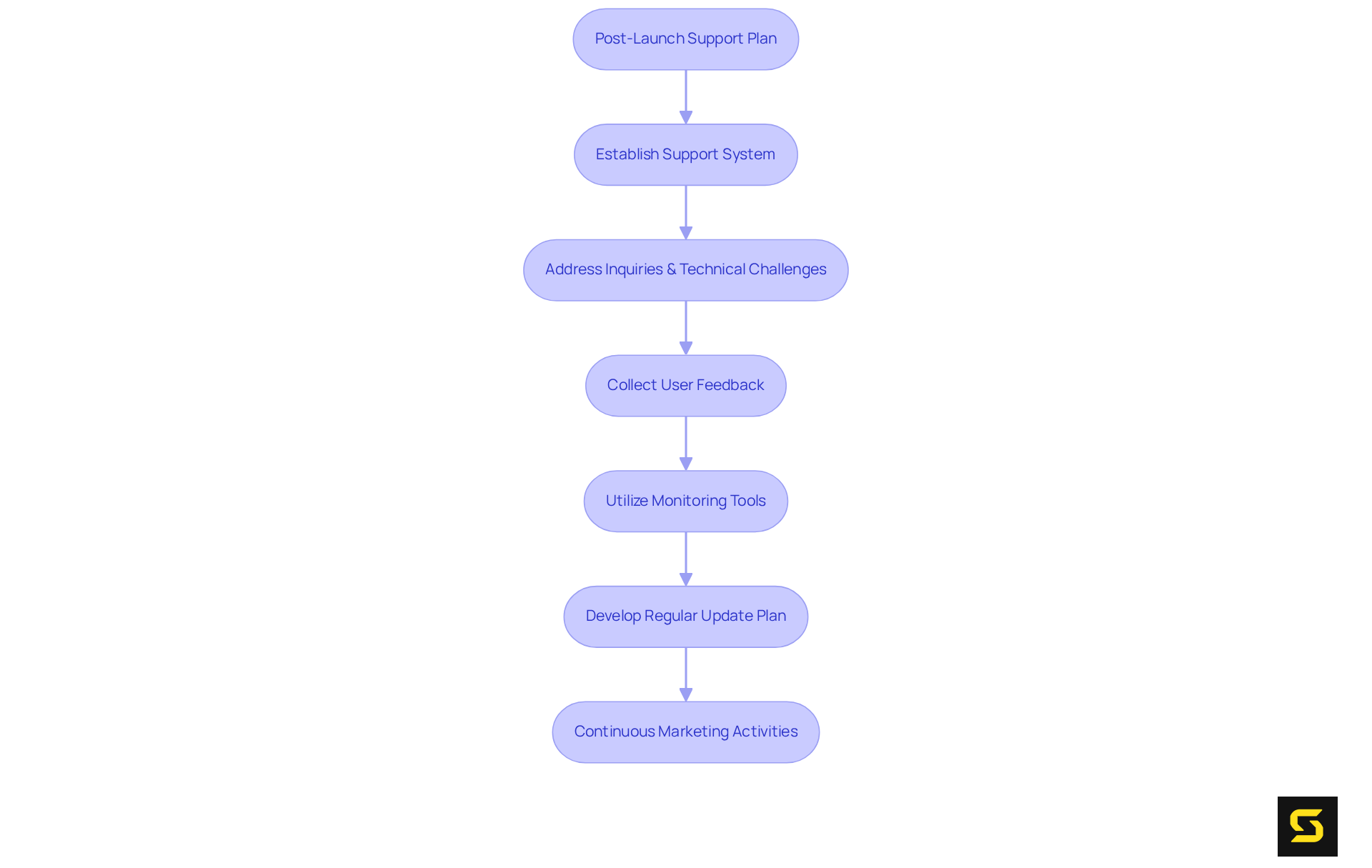
Conclusion
To achieve success in healthcare app development, prioritizing a clear understanding of the app's objectives and the specific needs of its target audience is essential. Engaging relevant stakeholders and conducting thorough market research allows developers to create applications that not only address critical healthcare challenges but also enhance user engagement and satisfaction. The integration of essential features, adherence to regulatory standards, and the selection of a knowledgeable development partner significantly contribute to the app's effectiveness and security.
This article highlights several key practices, including:
- Defining clear objectives
- Conducting competitive analysis
- Ensuring compliance with regulations like HIPAA
- Planning for ongoing support and improvements post-launch
Each of these elements plays a vital role in crafting a healthcare app that meets user demands while maintaining the highest standards of data security and functionality. Moreover, the importance of continuous feedback and adaptation to emerging trends cannot be overstated, as it ensures that the app remains relevant and effective in a rapidly evolving healthcare landscape.
Ultimately, the journey of healthcare app development transcends merely launching a product; it is about creating a lasting impact on patient care and accessibility. By implementing these best practices, developers can position their applications for success, leading to improved health outcomes and a more efficient healthcare system. Engaging with the evolving needs of users and the healthcare environment will pave the way for innovative solutions that transform the way care is delivered and experienced.
Frequently Asked Questions
What is the first step in defining a healthcare app's objectives?
The first step is to pinpoint the specific problems the app is designed to address by engaging with stakeholders, including healthcare professionals and prospective clients, to gather insights into their needs.
How can I identify my target audience for a healthcare app?
You can identify your target audience by developing personas that represent them, considering factors such as demographics, health conditions, and technology proficiency.
Why is it important to align the app's objectives with the target audience's needs?
Aligning the app's objectives with the target audience's needs ensures that the solution is relevant and impactful, enhancing user engagement and satisfaction.
What is a recommended approach for testing the app concept?
It is recommended to begin with an interactive prototype and allocate sufficient time to evaluate it with actual participants from your target audience.
What role does market research play in healthcare app development?
Market research helps to scrutinize current medical applications, identify their strengths and weaknesses, and understand industry trends, which informs the app's feature set and marketing approach.
What tools can be used for competitive analysis in healthcare app development?
Tools like SWOT analysis can be employed to assess competitors and uncover opportunities for differentiation.
What is a significant trend in the healthcare app market?
There is a surging demand for telehealth services, particularly effective in areas like behavioral health and oncology.
What should be prioritized in healthcare app development due to security concerns?
Security considerations must be prioritized, especially in light of projected increases in health system ransomware attacks.
How can understanding competitors influence app development?
By analyzing competitors, you can identify gaps, such as a lack of user-friendly interfaces, allowing you to prioritize intuitive design in your app to attract users.





